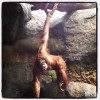Pongo pygmaeus pygmaeus
The head and body of the Bornean Orangutan are 4.5 to 5.5 feet long. The arm-spread is approximately 8.25 feet with females weighing up to 143 pounds and males weighing up to 317 pounds. They are the largest tree-dwelling mammal, and the only great ape living in Asia. The legs are relatively short and weak while the arms are long and powerful. Orangutans are primarily diurnal and arboreal.
While not as social as other apes, they may congregate when fruit is abundant. They construct nests high in the trees for sleeping, which are usually only used once. Smaller nests may be made for daytime rests. Orangutans use leafy branches held over their heads or large leaves draped over their head and shoulders as protection from both rain and sun. Tool use among fully wild orangutans does not compare with that of chimpanzees. Adult males spend over 90% of their time on their own. The interval between births is generally 3-4 years, though it can be as much as 8. Mothers look after their young for up to 8 years.

